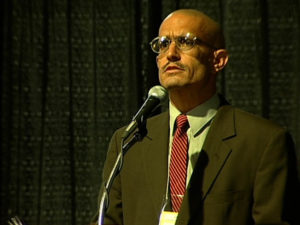As a sequel to The Yes Men (2003), The Yes Men Fix The World is more Die Hard 2. Directing themselves, anti-corporate jesters Mike Bonanno and Andy Bichlbaum pick up where Dan Ollman, Sarah Price, and Chris Smith left off, continuing their adventures in slightly different settings rather than re-imagining their mission. Despite the mock-heroic frame story that gives the film its title, Yes Men Fix The Word recapitulates the pleasures and frustrations of the earlier film. As before, the movie is not a documentary about the Yes Men, but a documentation of their performances, and a platform for their activism. They are masters of the http://www.egren.com/ct/naus-industrials/where-to-buy-cheap-doxycycline/ reductio ad absurdum, showing us the logical conclusion of the marriage between government and free enterprise. They pose as Exxon-Mobil to hawk prototypes of candles made from human corpses. At a risk assessment conference, Bichlbaum impersonates a spokesman for Dow Chemical to present the means by which they measure the loss of human life against profit, illustrating his gruesome calculation with a model of a golden skeleton. At their best, the Yes Men create a spectacle that makes the world where such things are plausible more outlandish than the stunt itself.
But film is not the Yes Men’s form. Their pranks are conceived for, and play out most successfully in, the senseless pace of the 24-hour news cycle. Bonanno and Bichlbaum have a keen feel for the workings of bureaucracy and media, but they are not adept live performers. Bichlbaum, who typically plays the corporate spokesmen and government officials the Yes Men burlesque, is wooden and awkward in character. This is helpful towards the end of mimesis — on stage at conferences, or in television interviews, he is believable as a self-conscious bureaucrat– but his apparent nervousness, and tentative improvisations blunt the edges of their critique. He never fully embodies the satirized character in the manner of, say, Stephen Colbert. The pranks are an excuse for the aftermath, but do not themselves unfold as dynamic experiences in time. As Bichlbaum fumbles around on stage in front of a half-empty room of subdued conference attendees, the bit starts to seem less like the elegant bit of theater you had imagined from its written account and more like a joke you begin to regret telling halfway through its narration.
Because the film is basically structureless, it feels much longer than 87 minutes. Although they differ in content, the arc of The Yes Men’s practical jokes is consistent, and usually ends with an admission that they did not achieve what they wanted. Watching the procession of stunts, it is easy to grow weary of their rhetoric. Having abandoned the hope of any political efficacy, the pranks do not stand on their own as comedy. Their most successful bits work because they seem to force their nemesis’ hand. As when they appear on the BBC as Dow Chemical to promise 12 million dollars in compensation to the victims of the Bhopal industrial disaster, or impersonate a HUD spokesman to promise the people of New Orleans that they would re-open the public housing that had been given over to private interests in the wake of Katrina. The hope here is that they have put Dow or HUD in a position where they must do something to remedy the misery they have wrought. But when nothing happens except an onslaught of hysterical PR, it is clear that the Yes Men have done nothing but shuffle chips around an abstract discursive realm. Watching this happen again and again, the movie proves the lie of the Yes Men’s claims to practical activism. When the bottom drops out on this premise, their jokes become a lot less funny because the humor depends on the apparently high stakes.
The Yes Men are the direct heirs of Negativland, Adbusters, and the other small organizations of the 80s and 90s who identified their tactics as culture jamming, an unfortunate moniker. But more broadly, they take part in the tradition of jokey agitprop that has captivated a certain segment of the American left since the 60s, and has operated as a subgenre of political documentary since Roger & Me. Practitioners of this kind of rhetoric wink at their supporters and address their adversaries with a disarming false naïveté. The intended effect is to make the need for their proposals seem self-evident, that only the craven self-interest of capitalists and politicians stands in the way of an ideal world. It is a reductive approach, but it can be a compelling way to describe the collusion of business, government, and media that creates and then obscures so many of the world’s tragedies. It does not, however, help us imagine a real way out. The Bhopal gag shows us how Dow Chemical could easily make reparations for their wrongdoing, but it does not show us what we can do when they predictably fail to respond, or how we can prevent something like it from happening again.
The Yes Men and their supporters would likely counter, correctly, by saying that changing the discourse, and drawing more attention to various injustices, has real political consequences. But this is territory the left has pretty effectively claimed. The Yes Men’s knowing, snarky gags appeal to an audience already primed for the message. The anti-corporate left’s need for banal and difficult organizational work far outstrips its need for good arguments and sexy packaging. It begins to feel like the appeal of this kind of activism is really its union of good citizenship with entertainment, that the proliferation of art made in this register has more to do with the facility of its consumption than a belief that this is the best way to go about changing things. There’s nothing wrong with preaching to the converted because they like the sound, but documentaries with serious political ambitions can do more. The best Yes Men pranks are the zenith of this mode of address. The exhaustion of their capabilities here signals the exhaustion of an entire technique.







well done. an insightful piece indeed.